Can you change the system while being part of it?
Read time – 9 mins.
Can you change the system while being part of it? This is the question that Melanie DewBerry raised in a recent interview with Reva Patwardhan on the Dialogue Lab Podcast, a show dedicated to helping social impact leaders thrive as they create change.
The interview was a dynamic one, and a number of questions were skillfully brought to the table on the subject of being an impactful leader in a way that is grounded in a deeper truth.
Each week in the Equality Hive blog series we explore powerful and thought provoking speeches or interviews with thought leaders who are bridging the gap of inequality with their spoken or written word, and in this blog post we will take a deep dive into the interview between DewBerry and Patwardhan, because it raised some crucial questions that we all need to ask if we are stepping into a leadership role to support others to make social change.
Leaving Consensus Reality
One of the core themes of the interview was whether or not we can create change from within the current consensus reality. “If you are trying to change the system you can’t change it by being part of it,” DewBerry shared. She went on to explain the challenges of trying to change the system from within.
“The consensus reality was created on violence and bloodshed. The system was not designed to support the average person in this world. Instead, it is a system that was created for the rich, white male, to keep them—and their sons—in wealth, and to keep their business running.”
“So they send their sons to colleges to understand how to run the businesses and they open it up to the rest of us to understand how to comply and become great little worker bees, and work hard for raises, and then get attached to things, because things require more money, and then we will work harder so we can have more.” She outlined, “We are not going to win by playing their game, their way.”
Whether you are someone who is stepping into a leadership role or down on the ground doing social impact work with your local community, DewBerry highlighted that we all have to make the same leap. “If you want to shift you have to start with the man or woman in the mirror and decide you are leaving consensus reality. Because most of us don’t understand to what level we are consciously or unconsciously subjected to the influences of how we think and how we operate, since we were born into this consensus reality.”
Consensus Reality and Self-Perception
DewBerry talked about how being part of consensus reality had influenced her self-perception, until she was able to recognize and break out of it. “Consensus reality wants me to believe that I am black, and I should be angry. And part of that I still hold onto because I am angry, and I’m not afraid to be black, and at the same time, they don’t get to write my story for me.” This point was central to the message she was sharing in the interview, because it helped her listeners see beyond the perceptions that others had about them, and to shape who they were outside of the projections of others.
“So when you can leave the consensus reality, it’s not about who they told you that you are, but more about how you embody your truth,” she shared.
“Listen to the real voice that is speaking to you, that wants to show you what real peace and real freedom are. We can’t be that when we are busy fighting and disagreeing with the others. Because the truth is, as long as you are standing even a little bit in opposition you are being unconsciously manipulated by the opposition. You have to leave it to create change.”
But what about folks who are doing important work down on the ground?
In response to this notion, Patwardhan asked how this works practically, with those advocating for change within the current system. She spoke for her listeners who are making a difference in the world, including those who are trying to serve their communities, make healthcare accessible, or bring services to people who are locked away in prison, and so on. She asked, “How do they carry out the work that they care about outside of the consensus reality?”
DewBerry responded, “I’m not asking you to leave the work, but more to think about your calling, where your sense of self is so aligned that you are being led at a higher level to do the work from that place.”
She referred to Harriet Tubman as an exemplary example of this. “As a slave, Tubman freed people. But how? She looked at her situation and thought ‘I can’t participate in this anymore. You are selling my family members. I can’t give birth because who knows what would happen to my children. I have to change this.’ And she was prepared to step out and surrender despite her own safety, and not need to know how it should be done, instead, following the voice within. People say she was guarded by angels because she should have been caught many times. And she was not. In her own words she followed divine inspiration. She was outside of their system.”
DewBerry then spoke directly to the audience. “Many people have said to me what you are probably thinking now. ‘I’m no Harriet Tubman or I’m no Gandhi,’ and I say to you, ‘Yes, you are.’ We all have a calling. If you think you can do it within the system and fight that system then you are doing it without divine inspiration. And you will make changes but you won’t evolve us as a people.”
She then went on to highlight the common theme among many of the respected leaders over time. “Somewhere they had a point of awakening and they started following that divine messaging that took them out of their own thinking and out of the thinking of the consensus reality and gave them the higher way to see this.”
So working in opposition means we are being shaped by the opposition?
“So we have to be in the work in a way that is rooted in something deeper than framing the opposition?” Patwardhan asked. Then again, bringing it back to the practical she inquired, “How can we find a way of talking about this that is going to be something that people can use.” She highlighted how she works “with people in advocacy and organizations that are shaped by an oppositional framework,” and shared, “When you are fighting to reunite families, driving to the border with a law background to help families who are being separated and detained, and so on, I’m not ready to say all the system stuff needs to go away.”
The System is a Mindset
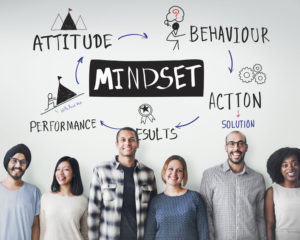
She highlighted that instead of reacting or responding to the current climate that we have to unite. “I think we need to come together maybe in small pockets and reframe ourselves. We have to tell our ancestral stories that help us remember who we are and what our medicinal properties are, and then start to organize ourselves from that place.” She went on to explain, “From there we could pluck out the remembering and the wisdom and embody it.”
She went on to share a story about how she shifted her mindset out of consensus reality. She told the audience that there was a period of her life where she had been understandably angry, and she knew if she carried on as she was then she would end up reacting in a way that would lead her to prison. The underlying theme was not feeling safe, so she asked for the universe to show her a sign that she was. Starting small, she went into a Macy’s store. As a black woman, she had always been followed by security guards in department stores, but on this day, she decided to ask for something different. She’d always kept her hands in her pockets in these times to show that she wasn’t stealing anything, but this time she walked around touching things. A white security guard approached her and, exasperated, she asked him, “What? What do you want?” and he turned to her and said, “I just want you to know that you have the most beautiful smile I have ever seen.” She shared how this was a turning point for leaving the mindset that had been projected onto her from the outside world.
So how do I advocate for larger social change?
Patwardhan, asked if there were any further ways that the audience can apply this teaching to social change, and DewBerry shared another important story about when she took part in a Native American vision quest a number of years ago.
“I think you have to leave the idea of change. Put it down for a minute. I’m gonna tell you a story that will frame that. So I was 4 days into my vision quest, no food, no water, and praying, when I was greeted by the Thunder Beings. They took me into a bubble where there was a world full of chaos. The sky was all grey. Children were being molested. Elders were not cared for,” she described.
She went on to outline, “Then they took me into the next bubble. The elders were resting under an apple tree. The girls there were taught to love their bodies. Children were protected. You get the picture.”
“‘Which world do you you want to live in’, they asked. And I said, ‘Easy. The world of beauty.’ And they replied, ‘Go back and create the world of beauty from the world of chaos.’”
“So instead of changing what already is, I have to take people home to the world of beauty. So, how do people create change? We have to have the vision to take each home. Instead of fighting them, let’s create a unified vision.”
She finished by sharing, “It took me 10 years to realize I had to go inside of myself and change my chaotic way of thinking and being that had been created by the consensus reality, and inhabit the beauty inside. And now I can honestly tell you that I have more beauty that I am creating from and that is making change in everybody I touch and everybody who touches me.”
You can listen to the full Dialogue Lab interview with Melanie DewBerry here.
BREAKING DOWN DEWBERRY’S MESSAGE
In my new book Catalyst: Speaking, Writing and Leading for Social Evolution, I share different ways to craft evolutionary messages that contribute to social change. DewBerry shares a social evolutionary message on a number of levels which you can apply to your own messaging as an evolutionary thought leader.
Visionary – One of the most powerful aspects of a social evolutionary message is sharing a vision with your audience that is based on a reality that they may not be able to see yet. If you are leading others to create change, one of the most powerful components is helping your audience envisage a world outside the one that they are currently experiencing.
- Deconstructing the Status Quo -An evolutionary thought-leader helps their audience break out of the limitations of the status quo. DewBerry’s explanation of consensus reality not only challenged the status quo, it explained the framework in which it had been constructed, and highlighted that it was a mindset that the audience needed to break out of for themselves and those around them.
- Grounded in History – Sharing Harriet Tubman’s story offered a practical example of the way in which DewBerry’s message had been applied historically.
- Personal Story – The story that DewBerry shared about the moment with the security guard that created a turning point, as well as of her vision quest, created a powerful, authentic and relatable connection with the listener. Stories such as these (and the context she shares with readers about why stories are important in the full recorded interview), ground concepts in real life experiences.
- Vulnerability with Strength – Before the story about the security guard (which she went into in much greater detail on the recorded interview), she shared with a mixture of vulnerability and strength her own path with her anger, how valid her anger was, and how she had worked to break free from it. The mark of an evolutionary thought-leader is someone who is willing to own their challenges and share with the audience how they have overcome them.
These core qualities can be applied to crafting your own social evolutionary message. However, it’s also essential to understand that much of the wisdom that DewBerry shared comes from a lived experience outside of crafting a powerful message for change. With a leader such as DewBerry—alongside a powerful interviewer such as Patwardhan—the teachings shared are not just carefully crafted, they are deeply lived too.
You can sign up for further social evolutionary blogs on our homepage. Each week we break down powerful speeches and interviews, as well as sharing our expertise on crafting messages for social change.
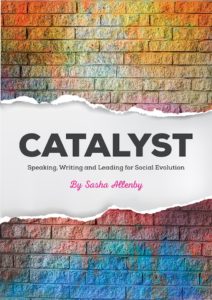



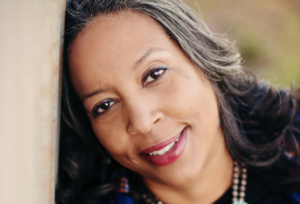
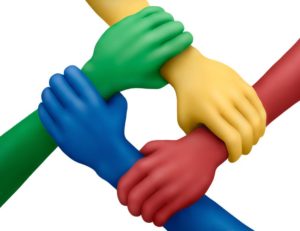
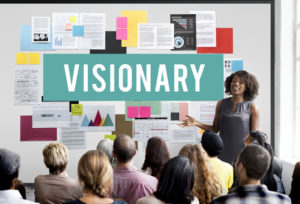 Visionary
Visionary